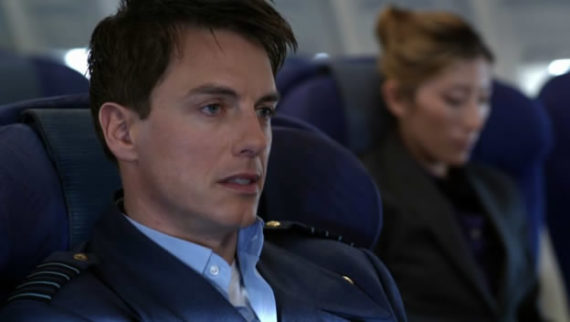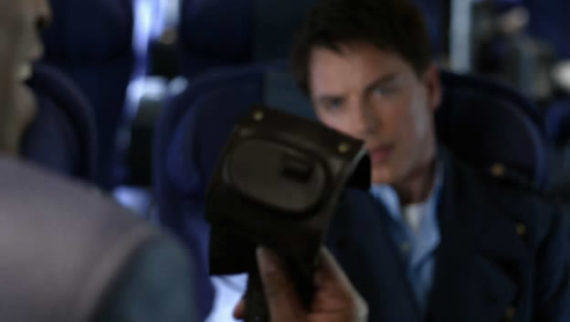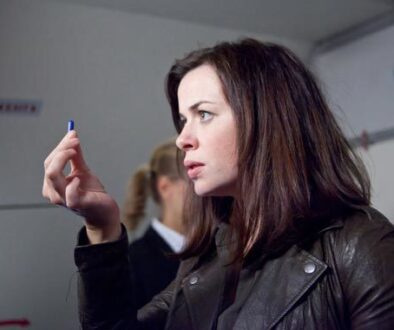Torchwood: Miracle Day Episode 2 Review

Clint Hassell reviews Rendition, the second episode of Torchwood: Miracle Day.
Before I review “Rendition,” the second episode of Torchwood: Miracle Day, I have a question for the Doctor Who TV readers. Despite the awesomeness of last week’s episode, “The New World
So, why am I asking this question? Do I mean to needlessly stir anti-American sentiment on this Web site or start a flame war against my posts? No. Actually, I’m about to make the “too American” argument about Torchwood, because, unfortunately, this week’s episode clearly demonstrates a “too American” quality that is damaging this show.
In The Writer’s Tale, Russell T Davies describes the writing process for a series of Doctor Who. Previously, Davies would write a general pitch for the series, usually just one paragraph per episode that described the basic concept or “hook” of each story and possibly the episode’s major story beats or action sequences. Davies then assigned episodes to individual writers who were responsible for fleshing out Davies’ story concepts into fully-realized scripts. Upon their completion, Davies then rewrote (sometimes almost completely) every script to maintain consistency in tone and characterization.
This practice is not common in the United States. Instead, all of a program’s writers gather, usually with the executive producer(s), in a “writer’s room.” Storylines are created communally during lengthy brainstorming sessions, and every plot point, action, and motive for a large part of a program’s season is meticulously outlined. Individual writers then volunteer to complete scripts based on which episodes interest them the most. While an executive producer may provide feedback, completed scripts do not receive major rewrites.
In several interviews, Davies has mentioned that he was interested in the creative challenge of working within the framework of the American scriptwriting system. And thus, the problem: by being created within a system that bends to group consensus instead of one commanding vision, the tone and characterization within “Rendition” were inconsistent with previous episodes of Torchwood. Further, by not rewriting Doris Egan’s lackluster script, Davies was unable to correct any of Egan’s lazy scriptwriting shortcuts, many of which exacerbate the aforementioned narrative inconsistencies.

What do I mean by “scriptwriting shortcut”? Take Rhys’ defense of Captain Jack in the teaser of “Rendition,” for example:
“Well, it’s like we all got switched, isn’t it? Nothing to do with Jack if the wires got crossed. Everything mortal becomes immortal, so everything immortal becomes mortal. See? I can be useful.”
This line is a bit of exposition, a bit the writer inserted to remind the audience that Jack was, at one point, as immortal as the rest of the world is now. Rhys didn’t need to restate this for Gwen or Jack – the two had already made the connection between “the miracle” and Jack’s loss of immortality in “The New World.” However, that was last week’s episode, and so the viewers need to be reminded again of the new status quo. Egan is redeemed in the use of this shortcut because she uses the scene to add depth to Rhys’ character – he is shown to be supportive and sensible – but, at many other points in her script, Egan’s shortcuts feel like cinematic cheats.
For example, once aboard the flight to the U.S., Gwen admits to missing Jack and that she is angry that he is only now returning to her life.
“Where did you go?” she asks.
“A long way away,” he answers, sidestepping any mention of Midshipman Frame.
“And did it help?”
Does Jack answer? No. He turns and stares wistfully into the distance, his longing gaze conveying that he is, indeed, still a tortured soul. This is a television trope, common to soap operas, and it is bad writing because it is not reflective of what happens in real life. In fact, Russell T Davies speaks against this very practice in The Writer’s Tale, and yet, he doesn’t fix it here.

The character of Lianna, the blonde, backstage production assistant (and you thought she didn’t have a name), is another insufferable scriptwriter’s shortcut. So timid she hides behind her clipboard, she’s also unrealistically self-righteous. “I hope you choke,” she barks to the food-hogging Oswald Danes. Really? Who says stuff like that, even to a convicted killer? Yes, the concept of Oswald living forever in a society that openly shuns him is important to his character arc, but it did not need to be introduced in such an unrealistic manner. It would have been more effective, even chilling, if she had remained silent, too scared to approach Danes. As Oswald noticed her staring from behind her clipboard, her face full of fear and judgment, he could have explained his reason for taking surplus food, only to be met with silence. Without the unnecessary exposition, the scene would have focused more on the powerful character moment of Danes realizing the extent of his future as an ostracized outcast.
The WWCN News interview with Danes is just as problematic. The newscaster’s righteous indignation and thinly-veiled malice breaks with any form of journalistic integrity, and, since the episode posits that this is a newscast and not a sleazy, sensational, syndicated talk show, this scene feels false. (For those curious, it’s not that the newscaster has a bad American accent; it’s that he’s overacting.) The host continues to goad and berate Danes, shaming him to the point of tears. Why? What is he wanting? Really, the newscaster’s motives are unimportant; again, this is a scriptwriter trick to allow the audience (mirrored within the show by the CIA analysts) to first condemn, and then be swayed into pitying, Danes. However, the scene is so poorly written and unbelievable, that the effect is ruined.
The scene involving Jim – the lab tech that mentions the Greek myth of Tithonus – is pompous, pretentious and unrealistic.
And I’m supposed to believe that thoughtless, bigoted, uneducated Rex has read about the cosmetic habits of a gay Slovenian man from the 1800s? Yeah, right. To increase the dramatic tension of Jack’s poisoning, the audience needs to be reminded again that Jack was at one point – but is no longer – immortal. An easy way to accomplish that is to mention an ex-boyfriend from a time so distant that Jack must be hundreds of years old. However, wouldn’t it have made more sense from a character standpoint (and been funnier) if is-he-or-isn’t-he Danny had said the line?
(Historical side note: in the Victorian era, arsenic trioxide was mixed with chalk and vinegar and consumed by women in the hopes that it would make their faces appear paler and indicate that they did not work in the fields.)

This, however, brings us to the most egregious of Egan’s script shortcuts: that Greta is apparently an airline stewardess/airline engineer. One of my biggest pet peeves in scriptwriting is what I call the “omniscient scientist” shortcut. You’ve all seen it: a disaster movie where a rag tag group of survivors must escape a burning building or an overturned boat. During the course of the adventure, the high school science teacher delivers a baby, digs a bullet out of another character’s shoulder, identifies a poisonous plant, concocts an explosive device from spare parts, and hacks into a encrypted computer. The scriptwriter cheats by having a character knowledgeable in, say, biology, demonstrate mastery in all areas of medicine, botany, chemistry, physics, and engineering. The scriptwriter assumes that you’re too dumb to realize the shortcut – an attitude which is both lazy and insulting.
I have a friend (Hi, Dottie!), who is an airline stewardess for a major airline. In her daily life, she is amazingly capable, sophisticated, and well-educated. As a stewardess, she is trained in so many more areas than I would have ever considered, including close-quarter combat and emergency management. However, after an extensive conversation regarding the plot details of “Rendition,” I can assure everyone that a stewardess would have no idea as to the color of the degreaser tubing or how to access the landing gear from inside the cabin.
Actually, this lack of believability, especially in the area of science, is endemic of Miracle Day as a whole, which is ironic since the shows asks the audience to consider the consequences of a medical “miracle.” Some mistakes are easy to overlook: physics states that when the truck carrying the metal beams that shafted Rex’s chest rear-ended the vehicle in front of it, the beams should have continued traveling forward, not backwards toward Rex’s car. It would have made more sense if Rex had been hit from behind. Also, since Rex has a major chest wound, aspirin is the last medication he should be taking. Aspirin has an antiplatelet effect that inhibits the blood’s ability to clot and cover over the walls of damaged blood vessels.
Why, of all things, does Jack’s vortex manipulator monitor sodium levels? Yes, all of the scenes involving the vortex manipulator are meant to show Rex’s character arc this episode. First, Rex doesn’t trust Jack and Gwen (he takes the manipulator), then he is curious about Torchwood (he tries to figure out how the manipulator works), and then he demonstrates his openness to investigating their claims (he calls Dr. Juarez and asks about his sodium levels), before showing that they have earned his trust (he returns the manipulator to Jack). But sodium levels? It would make more sense for the manipulator to monitor iron levels – an indicator of blood loss – which would also serve as a clue to Jack and Gwen that Rex is wounded and should be dead. Remember, currently, Rex is keeping this a secret from them. Would they expose him to the same risks knowing that he is injured? Or more risks, since he should already be dead?

While Miracle Day is correct in that, the “miracle” event described could create antibiotic-resistant organisms, the scientific reasoning is wrong. The program states that, “when a person dies, the bacteria can feed on the corpse and no one minds.” That’s incorrect. The bacteria end up dying off, either quickly, because the body is cremated, or more slowly, because the dead body only provides sustenance to the bacteria for a limited amount of time. Instead, a real life “miracle” would keep infected bodies alive, which would continue to provide sustenance for the bacteria, which would grow to such massive numbers that (a) it would take more antibiotics than available to kill, and (b) rare mutations that might led to antibiotic resistance would become a statistical probability.
Also, Jack’s immortality should not have any effect on his immune system, since he was, let’s say, in his early thirties when Rose resurrected him. Your immune system is developed mainly during childhood. Further, Jack is from the 51st Century and he was a Time Agent. If the Time Agency could erase the memory of two years of Jack’s life, why can’t they inoculate him against common viruses? Besides, your immune system protects you from pathogens and tumor cells, not from being poisoned by toxic chemicals. (And, for the record, Jack’s lips were blue, despite what Gwen says.)
Finally, regardless of the fight sequences seen in spy flicks, it is not that easy to break someone’s neck by twisting it to one side. Look over one shoulder. Notice that you’d have to twist your head two or three more inches before beginning to tear muscles or breaking the bones of the vertebral column. Is the neck an incredibly unprotected area of the body? Yes, definitely. However, it is not feasible for Rex, lying on his back, with no leverage and no ability to use Lyn’s body weight as assistance, to break Lyn’s neck as easily as portrayed. A better solution (though still difficult to do) would have been for Rex to punch Lyn in the throat or to strangle her, crushing her hyoid bone, and collapsing her windpipe. The scene with Lyn, her head turned all the way around, stumbling after Esther’s getaway car, was unfortunately played for laughs. Imagine how chilling that scene could have been if she had instead been clutching at her throat, gasping for a breath she was unable to take.

Of course, none of this compares to the sheer inanity of Gwen and company being able to prepare an antidote for arsenic poisoning while airborne over the Atlantic. Hey, all you readers of legal age, let’s make this a fun drinking game. Take a shot for every reason Jack should have died in this scene. Let’s begin!
First of all, it takes very little arsenic to kill a man – 0.292 g is fatal. Even assuming that Lyn’s capsules contained many times the fatal dose, there would still be precious little arsenic contained within. Most of the powder Jack felt was starch, a common filler in capsule medications, which would not have felt any different than the insides of any other capsule. Jack would not be able to identify arsenic by touch alone (shot #1). Further, arsenic can also be absorbed through the skin, meaning that Jack actually exacerbated his condition by touching the capsule’s contents (shot #2).
But, let’s assume that Lyn confessed to poisoning Jack with arsenic. The episode is correct in identifying chelation therapy as the best treatment, however, Dr. Juarez incorrectly identified ethylenediaminetetraacetic acid, or EDTA, as the preferred drug of choice. Actually, arsenic poisoning is treated with dimercaprol (or, “British anti-Lewisite” for you WWII buffs), not EDTA, which is used to sequester calcium, iron, and mercury (not arsenic), and why EDTA is commonly used to dissolve limescale (shot #3). Further, Dr. Juarez would never advise the use of EDTA, because the U.S. Food and Drug Administration has not approved EDTA for chelation therapy (shot #4).
But, hey, one chelating agent is as good as the next, right? (It’s not.) So, let’s assume that EDTA could be used for this purpose. EDTA is synthesized from 1,2-diaminoethane, formaldehyde, and sodium cyanide. It is true that you can oxidize methanol to create formaldehyde, and that methanol can be found in the fuel cells of some laptops. (Though, who had a laptop, other than Lyn? Were there several just lying around? Why? Does the airline provide them? What kind of swanky airline is this? And wouldn’t all of the laptops be the same? Can’t Danny just check one? But I digress.) It is also true that silver can be used as a catalyst. However, this is only possible if the surface of the necklace is actual silver, and not plated with rhodium (which creates the bright, shiny finish that might have attracted Rex’s attention). Even assuming that Lyn’s necklace was not rhodium-plated, methanol oxidizes at 650 °C, a temperature far in excess of even the hottest of coffee pots, which brew coffee using water that is close to boiling (remember, water boils at 100 °C – and that’s shot #5). Further, formaldehyde boils at -2 °F, so it would immediately escape the coffee pot as a gas (shot #6). And, even if you could successfully create formaldehyde from methanol, and keep it from escaping the container, there is no way to isolate the formaldehyde produced from the methanol reactant, meaning that, not only can Gwen not measure the precise amount of formaldehyde she needs (formaldehyde is toxic – as little as 1/3 oz. is fatal – so precision is key; shot #7), she cannot guarantee that she is not also injecting Jack with methanol, which is also highly toxic (10 mL can cause blindness; 30 mL is fatal; shot #8).
That’s eight shots. And we’ve not even started on the 1,2-diaminoethane. Are you feeling woozy yet?
Gwen states that they need “dichloromethane” to produce the EDTA. Actually, it’s 1,2-dianimoethane that’s needed, but since it is possible to use ammonia (mentioned as necessary once, and then never again) to produce diaminothane, I’ll let it slide. (However, since it would not be possible to carry out that reaction outside of a laboratory, you still have to take a drink. That’s shot #9!) Gwen somehow knows the incredibly arcane fact that dichloromethane can be found in degreaser. Thankfully, Greta, the stewardess so dim she has yet to have a line in this episode, knows the color of the tubing of the automatic degreaser, and poor, sweet, kinda-gay Danny knows the exact panel to remove to access the landing gear. (As they collect the degreaser, Gwen laughs and cheers and carries on as if she’s just given birth, or won the lottery, or found Moby Dick after all these years. I was actually embarrassed for Eve Myles. But, again, I digress.)
Once again, Gwen has no way of separating the necessary dichloromethane from the other ingredients in the degreaser. This creates two problems: (a) the other ingredients would also be toxic to Jack (shot #10), and (b) the other ingredients would create side reactions that would severely inhibit the reaction of dichloromethane and ammonia to form diaminoethane, and of the diaminoethane, formaldehyde, and sodium cyanide to form EDTA (shot #11).

I won’t even make the argument that Danny’s diabetic needle is far too large for his condition, or that when Gwen taps the tip of the needle – a move used to consolidate air bubbles so that they can be expelled before injection – she then fails to removes what looks to be 8-9 mL pocket of air, which will cause a fatal air embolism when injected (shot #12). I will point out that chelation therapy is delivered intramuscularly, and not intravenously (shot #13). And while I won’t point out that chelation therapy takes one to two days to be effective, I will note that EDTA is an anticoagulant, so the bloody diarrhea that Jack most likely has (a common symptom of arsenic poisoning) – well, it just got a whole lot worse (shot #14).
Seriously, that one scene has got to be the absolute worst in the history of Torchwood – and that includes “From Out of the Rain,” the episode where evil circus performers crawled off of old film stock to haunt a movie theatre. (Don’t remember that one? Good, the Retcon is doing its job.)
Humor aside, are my gripes about of Torchwood’s scientific inaccuracies silly? Of course, when you consider that the show posits that an immortal alien from the future, who once traveled with another immortal alien from the future, and who now resides in present-day Wales, investigates alien technology that appears through a rift in spacetime. However, the real story of Torchwood (or Doctor Who, for that matter) has never really been about the show’s fantastical elements, but about the human emotions and character development that can be found within the narrative. Miracle Day asks us to consider mankind’s reaction to this “miracle” happening in “real” life. Every time something so scientifically inaccurate occurs, it detracts from how “real” the Torchwood universe feels, and places even more burden on the audience to suspend disbelief.
Unfortunately, another flaw in Doris Egan’s script is that the characters are not written as consistent within the narrative. Egan not only destroys much of the characterization built in “The New World,” she manages to subjugate much of the character development accomplished in previous series. Before the opening credits even roll, Rhys is left in Wales to care for Anwen. Not only does this reduce Rhys’ previously-established roles as Gwen supporter, family leader, and moral voice, it reduces Gwen’s character as well; we will miss seeing her as a mother. (They said we’d be returning to Wales each episode, but if it’s just to “meanwhile” with Rhys, I’m going to be very disappointed.) Further, what happened to the emotionally-scarred Gwen? One minute she’s being forced onto a plane; the next, she’s casually discussing thorny roses with Jack.
Why was Sergeant Andy helping to restrain Rhys? That is entirely out of character. Didn’t Children of Earth demonstrate that, despite being milquetoast, Andy could be counted on to do the right thing?

Now that he is unhampered by a hospital bed and brought central to the storyline, this should have been the episode where the audience connected with Rex. Instead, I hate him. Gone is the layered character who could weep at the realization of his own mortality; gone is the driven CIA agent, overly-dedicated to his own ambition. Instead, we find that Rex is thoughtless, pompous, and smug. “Now, listen, I’m not gay,” he tells Danny, “but I’ll let you feel me up if you go get me a vodka.” Rex may not be gay, but he is an asshole, and while well-written characters do not have to be likeable, Rex is portrayed as such an extreme stereotype (and a foppish one at that – his dismissive wrist wave as he told Rhys to go do “spousal stuff” was obnoxious) that it is not possible to take his character seriously.
Also underserved in Egan’s script is seemingly-unlikeable, Oswald Danes. While his aforementioned conversation with Lianna added details to his backstory, Oswald’s sobbing apology seemed extremely uncharacteristic. Was that a genuine display of emotion? If so, why is he just now breaking down? He was unrepentant during the trial, he’d spent six years in solitary confinement, and seemed unremorseful at his execution. So, why the emotional hysterics now? For Oswald’s character to grow, we need to see the motives behind his actions.
Better served this week is Miracle Day’s new female cast member, Esther, who is shown to be remarkable because she is observant. A well-placed white lie, a little identity theft – I appreciate that the story didn’t necessitate Esther crawling through an air conditioning duct to escape from the CIA building. I love that she is resourceful enough to steal a car, and normal enough to be a nervous wreck about it. My only regret is that Esther’s diminished role in this episode served to marginalize her character arc, though I am betting that Charlotte Wills’ warning that one day she will have to “commit,” that “in the end, [she’ll] have to take sides,” is a nice bit of foreshadowing.
The character best-served by Egan’s script is P.R. rep, Jilly Kitzinger. (“Jilly”? What kinda of name is that?) A fiery redhead who smokes, she first appears in a bright red suit (in an elevator going down, no less – they are laying on the she’s-the-Devil symbolism kinda thick). She uses inane small talk to disarm. She emphasizes “do it,” even when it’s not used as a euphemism, knowing that your mind will still equate her words with sex. She’s prepared. She in public relations (“If the Devil himself walked this earth, he’d surely be working in P.R.”), a “talent spotter” for other . . . “employers” (cue ominous dun-duh-DUN! music). If the scant two scenes she was in are any indication, Lauren Ambrose could easily become Miracle Day’s breakout star.

What else did I like about “Rendition?” I like the new pre-teaser opener that recaps the basic premise of the show before offering a montage of previously-seen clips. “One day . . . no one dies. Next day . . . no one dies. And the next, and the next, and the next . . .” reads the captions, as a world population counter begins to feverishly cycle upwards from 6,928,198,254. Drawing in new viewers mid-series can be difficult for a mini-series, so I think that briefly restating the shows basic premise – that the absence of death will cause the world population to expand beyond control – is a smart move.
While I do not appreciate the lack of fact-checking (for example, The Oprah Winfrey Show ended in May, which may seem like an understandable oversight, except that Oprah had been publicizing the end of her talk show for almost two years), I loved the insight and creativity Egan’s script demonstrated in showing how the “miracle” might affect religion and morality. Jilly states that “churches are empty.” Esther recounts how the Hindu population of India has become more forgiving, despite there no longer being repercussions in a reincarnated afterlife. A newscaster asks if suicide even exists. As mankind realizes that death will no longer end suffering, pain management will become the most humane of choices. Dr. Juarez recognizes that the manufacturing of pain killers needs to be increased immediately to get a head start on the oncoming demand. Note that the very next scene involves Dr. Juarez receiving a text from Rex who demands, “BRING ME DRUGS,” his injury nicely paralleling current – and foreshadowing upcoming – storylines.
Speaking of Dr. Juarez, I am happy that, when she changed the policy regarding triage procedures, she acknowledged that the dean of medicine should actually be the one making policy decisions for the hospital. This one line portrayed her as both resourceful and ethical, and kept her from falling into the trope of badly-written TV doctors who overstep their authority with no repercussions.
I do appreciate that a reason is stated for why the CIA is watching YouTube videos and TV news all day, and why they focus on Danes. “He’s the miracle, made visible.” In real life, he would be the focus of a media frenzy, or did anyone else miss the Casey Anthony trial?
(Still, reading? Thanks! The first five people to give me their mailing address get Torchwood: Miracle Day squeeze balls.)
Finally, there is one other way that Torchwood has become “Americanized” that is annoying me. I feel that Miracle Day is hoping to garner ratings by filling every new role with a recognizable American actor. I rarely recognize the guest actors from previous series of Doctor Who or Torchwood, and it has helped me to immerse myself more fully in the fantasy. With Miracle Day, I am having a difficult time not seeing the characters as “that chick from Dollhouse” (Dichen Lachman, who sleepily slurred her lines together as one big run-on sentence – the definition of a phoned-in performance), or “the creepy guy from Jurassic Park” (Wayne Knight, playing the same nebbish character as always), or “that girl from Six Feet Under.” Heck, I even recognized the actor playing Jim, the mythology-loving lab tech (played by Jeffery Self from Jeffery & Cole Casserole). Perhaps viewers in Britain are having the opposite experience and relishing finally being able to watch an episode of their favorite show without recognizing “that guy from Gavin & Stacy.”








